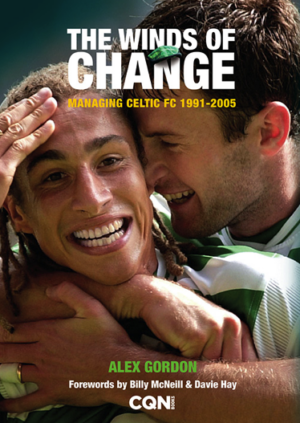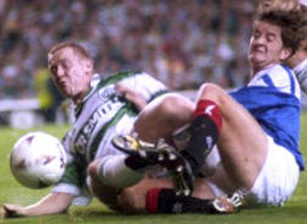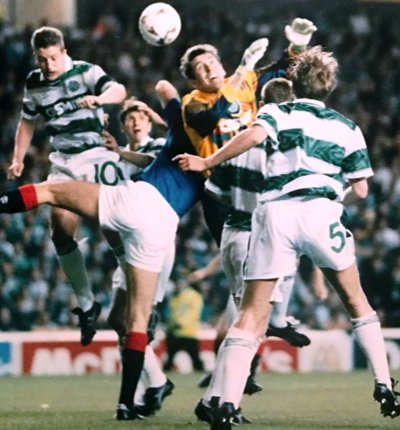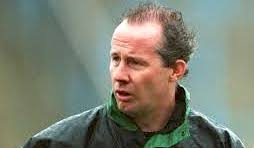LIAM BRADY was named as Billy McNeill’s successor as Celtic manager in June 1991.
The charismatic Irishman arrived with a dream for the club, but his vision had become blurred by the time he departed in early October 1993.
In another CQN EXCLUSIVE series, author Alex Gordon opens his book files to look back at an intriguing and compelling chapter in the club’s history.
Here is another edited extract from Alex’s tribute book, ‘The Winds of Change‘, published by CQN in 2015.
Please enjoy.

ON SEPTEMBER 22 1993 at Ibrox, the Celtic players had the opportunity to carve out their own piece of history.
Liam Brady and Joe Jordan worked with the squad during training in the lead-up to the League Cup confrontation against Rangers at Ibrox and both were satisfied everyone was aware of the expectation levels. John Collins failed a late injury test, but, otherwise, it was a strong Celtic team.
Alas, they blew it big-style. For the second successive season, they lost 1-0 in a semi-final to their fiercest rivals. Even worse, like the Scottish Cup defeat the previous term, they capitulated once again to 10 men. With the tie goalless, Peter Huistra was sent off five minutes into the second-half after aiming a wild kick at Tom Boyd.
Referee Douglas Hope couldn’t miss the foolishness of the Rangers winger and had no hesitation in flashing a red card.
The Celtic support could sense a win on this occasion and were cheering wildly when Dariusz Wdowcyzk swung over an arcing right-wing corner-kick with his left foot and Stuart Slater, unmarked at the far post, looped a header over Ally Maxwell only for Gary Stevens to knock his effort off the line.
The optimism was short-lived, unfortunately, when Rangers took the lead in the 65th minute after some dire defending from Mike Galloway.

OFF NIGHT…Mike Galloway crunches into a tackle on Peter Huistra before the Rangers was red-carded and the Celt presented the home side with the winner.
Stevens pushed the ball fairly aimlessly down the right touchline and Galloway, yards ahead of the lurking Ian Durrant, sauntered across to deal with the situation. The simple thing would have been to touch it out for a shy. Galloway, alarmingly, got his feet in a fankle, Durrant took control, launched a low ball across the face of the goal and Mark Hateley prodded in the gift from six yards.
And yet Celtic still had 25 minutes to do something about it against a team with a player short. The best chance of the evening fell to Paul McStay, in the clear about 12 yards out, but the skipper, so often a hero, belted it high and wide with the ball flying into the Celtic supporters behind Maxwell’s goal.
And with that wild and wayward attempt went the team’s hopes of levelling the tie and taking their toiling opponents to extra-time. A grinning Walter Smith said, ‘That’s our best performance of the season. You’ve got to give credit to Ian Durrant for capitalising on the Celtic player’s error.’
Liam Brady kept his thoughts to himself.

AIR RAID…Pat Bonner is under pressure as a high ball drops into the box.
I talked to him the following morning. He was as depressed as I had ever heard him. He didn’t even attempt to hide the fact that the club hadn’t played well and had let down the support. I made the point that Celtic had been keeping three players back late in the game when they were about to take corner-kicks.
Tom Boyd, Mark McNally and Galloway were strung along the halfway line against a lone Ranger, Hateley, who was absolutely spent and working off memory. Brady, without pointing the finger of blame at anyone, answered, ‘Joe likes the defence to keep its shape.’
I didn’t reply. Celtic, with a man advantage, were actually a man short in their opponents’ penalty area in these situations. It made no sense then and it makes none today. In the Brady era, mistakes were made and brutally punished.
Fourteen days after our private and off-the-record conversation, Brady handed in his resignation. I wasn’t surprised.
* TOMORROW: Don’t miss the next riveting instalment of the Liam Brady story – only in your champion CQN.

